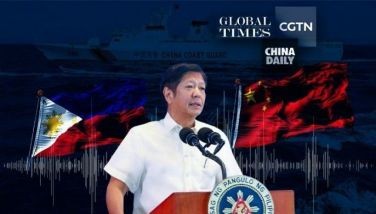Bullish

November 21, 2006 | 12:00am
Christmastime starts early this year. There is a sense that things are getting better. And it is not just because of Manny Pacquiao’s spectacular win last Sunday.
Last week, the IMF raised growth projections for the Philippine economy, following the World Bank’s lead. The peso continues to hold its ground against the dollar, defying the trend in regional currencies.
Investment growth surpassed targets. The budget deficit is lower than expected. Government revenues continue to grow robustly. Our international reserve level is unprecedented.
Analysts are expecting the peso to climb up to P47:$1 by the start of the new year as remittances exceed expectations and investor interest, especially in the massive infrastructure program planned, continues to improve. The privatization of our power sector assets will further boost investment opportunities.
The Philippine Stock Exchange Index is expected to exceed its all-time high in the first few months of the new year, with initial public offerings lined up for January. The stability of the peso encourages international investments to take positions in our market.
Like icing on the cake, the scenario for political stability dramatically improved over the past few weeks.
A number of high-profile trouble-makers are now safely in jail. Atong Ang has been extradited and detained. The fugitive Gringo Honasan, the man almost who single-handedly made coup plotting a cottage industry, has been captured and is now detained at the Sta. Rosa facility. Even the armed insurgencies seem to have quieted down in the face of a relentless military campaign to stamp them out.
The key element in the bright economic prospects we now enjoy is the vastly improved capacity of government to raise revenues.
Nobody loves the taxman. But in our circumstances, the taxman is the one principally responsible for bringing our economy back to life.
Improved government revenues enabled us to cut our chronic deficits. Those revenues allowed us, in fact, to prepay some of our indebtedness. They dramatically reduced government’s propensity to borrow.
A lower government appetite for borrowing, in turn, helps keep down interest rates. The lower cost of money, coupled with a strong currency, has pushed down inflation to a range lower than expected. That conserves the purchasing power of wage earners.
With improved revenues, government is now ready to support economic expansion with investments in infrastructure. It allows government, as the 2007 budget indicates, to raise public sector wages and thus prevent the migration of talent out of the bureaucracy. It helps strengthen the currency by easing repayment concerns on our debt and diminishing interest charges on them.
Commissioner Jose Bunag has done a good job pushing internal revenue collections up by an astounding 23% year-on-year. Our revenue inflows are now at unprecedented levels – despite the fact that there has been no increase in the budget for BIR.
The spectacular growth in our revenue collection overshadows the fact that for the month of October, the collection target was slightly missed. That is hardly an issue for a large number of reasons: RVAT collections for oil were credited to the Bureau of Customs, others were credited directly to the National Treasury, the targets might have been arbitrarily set, a lower interest rate regime means lower collection from this major source of revenues.
Our internal revenue service, overseeing a large number of taxpayers, has only 5,000 examiners. By contrast, Vietnam’s revenue service employs 20,000 examiners even if it has vastly less taxpayers to service.
If we are to keep the momentum of our resurgent economic growth going, the administration must ensure the sustainability of our revenue performance. That is, as I tried to explain above, the key link in the virtuous cycle we now see in the domestic market and the fiscal condition.
The multilateral institutions – such as the IMF, the WB and the ADB – have repeatedly reminded our government that for the positive momentum to continue, we must continue improving on our revenue administration.
Those gentle reminders by people sympathetic to our potentials for growth are, I suppose, composed of two elements: first, the revenue collection agencies must be kept as free as possible from politicization; second, investments must be made in improving the institutional capacity of the revenue agencies themselves.
The first consideration is a rather emphatic one considering that we are entering an election year. It is understandable that those revenue districts led by people known to have been installed there by way of political pressure rather than by pure merit are the very same districts that perform worst.
Our internal revenue bureau has been too politicized as it is. Any hint of further politicization of this bureau will send a very disappointing signal to the markets indeed.
The second consideration is a strategic one. The same revenue bureau we had when we collected a tenth of what we do now has not been benefited by increase in personnel, equipment and the capacity to attract talent.
Whatever new capacities the bureau has was due to official development assistance from friendly governments who understand better than most of our politicians the strategic value of an efficient and competent revenue service to our overall economic performance. Whatever dramatic improvement there has been in the volume of revenue collections has been due to the same number of people working harder and harder each day – and also to a significant reduction in leakages for which this agency was notorious for.
We cannot expect the market to be convinced that our dramatically improved revenue collection level could be sustainable unless government makes new investments in upgrading the institutional capacity of the BIR. It should be worthwhile for the few truly competent legislators we have in both chambers of Congress to revisit the proposal to re-engineer the BIR by making it a more corporate organization insulated from corrupt political interference. That will yield longer term results than the present law that simply threatens existing employees with early retirement if they fail to deliver.
Last week, the IMF raised growth projections for the Philippine economy, following the World Bank’s lead. The peso continues to hold its ground against the dollar, defying the trend in regional currencies.

Investment growth surpassed targets. The budget deficit is lower than expected. Government revenues continue to grow robustly. Our international reserve level is unprecedented.
Analysts are expecting the peso to climb up to P47:$1 by the start of the new year as remittances exceed expectations and investor interest, especially in the massive infrastructure program planned, continues to improve. The privatization of our power sector assets will further boost investment opportunities.
The Philippine Stock Exchange Index is expected to exceed its all-time high in the first few months of the new year, with initial public offerings lined up for January. The stability of the peso encourages international investments to take positions in our market.
Like icing on the cake, the scenario for political stability dramatically improved over the past few weeks.
A number of high-profile trouble-makers are now safely in jail. Atong Ang has been extradited and detained. The fugitive Gringo Honasan, the man almost who single-handedly made coup plotting a cottage industry, has been captured and is now detained at the Sta. Rosa facility. Even the armed insurgencies seem to have quieted down in the face of a relentless military campaign to stamp them out.
The key element in the bright economic prospects we now enjoy is the vastly improved capacity of government to raise revenues.
Nobody loves the taxman. But in our circumstances, the taxman is the one principally responsible for bringing our economy back to life.
Improved government revenues enabled us to cut our chronic deficits. Those revenues allowed us, in fact, to prepay some of our indebtedness. They dramatically reduced government’s propensity to borrow.
A lower government appetite for borrowing, in turn, helps keep down interest rates. The lower cost of money, coupled with a strong currency, has pushed down inflation to a range lower than expected. That conserves the purchasing power of wage earners.
With improved revenues, government is now ready to support economic expansion with investments in infrastructure. It allows government, as the 2007 budget indicates, to raise public sector wages and thus prevent the migration of talent out of the bureaucracy. It helps strengthen the currency by easing repayment concerns on our debt and diminishing interest charges on them.
Commissioner Jose Bunag has done a good job pushing internal revenue collections up by an astounding 23% year-on-year. Our revenue inflows are now at unprecedented levels – despite the fact that there has been no increase in the budget for BIR.
The spectacular growth in our revenue collection overshadows the fact that for the month of October, the collection target was slightly missed. That is hardly an issue for a large number of reasons: RVAT collections for oil were credited to the Bureau of Customs, others were credited directly to the National Treasury, the targets might have been arbitrarily set, a lower interest rate regime means lower collection from this major source of revenues.
Our internal revenue service, overseeing a large number of taxpayers, has only 5,000 examiners. By contrast, Vietnam’s revenue service employs 20,000 examiners even if it has vastly less taxpayers to service.
If we are to keep the momentum of our resurgent economic growth going, the administration must ensure the sustainability of our revenue performance. That is, as I tried to explain above, the key link in the virtuous cycle we now see in the domestic market and the fiscal condition.
The multilateral institutions – such as the IMF, the WB and the ADB – have repeatedly reminded our government that for the positive momentum to continue, we must continue improving on our revenue administration.
Those gentle reminders by people sympathetic to our potentials for growth are, I suppose, composed of two elements: first, the revenue collection agencies must be kept as free as possible from politicization; second, investments must be made in improving the institutional capacity of the revenue agencies themselves.
The first consideration is a rather emphatic one considering that we are entering an election year. It is understandable that those revenue districts led by people known to have been installed there by way of political pressure rather than by pure merit are the very same districts that perform worst.
Our internal revenue bureau has been too politicized as it is. Any hint of further politicization of this bureau will send a very disappointing signal to the markets indeed.
The second consideration is a strategic one. The same revenue bureau we had when we collected a tenth of what we do now has not been benefited by increase in personnel, equipment and the capacity to attract talent.
Whatever new capacities the bureau has was due to official development assistance from friendly governments who understand better than most of our politicians the strategic value of an efficient and competent revenue service to our overall economic performance. Whatever dramatic improvement there has been in the volume of revenue collections has been due to the same number of people working harder and harder each day – and also to a significant reduction in leakages for which this agency was notorious for.
We cannot expect the market to be convinced that our dramatically improved revenue collection level could be sustainable unless government makes new investments in upgrading the institutional capacity of the BIR. It should be worthwhile for the few truly competent legislators we have in both chambers of Congress to revisit the proposal to re-engineer the BIR by making it a more corporate organization insulated from corrupt political interference. That will yield longer term results than the present law that simply threatens existing employees with early retirement if they fail to deliver.
BrandSpace Articles
<
>
- Latest
- Trending
Trending
Latest
Latest
Recommended

June 8, 2024 - 9:35am


























